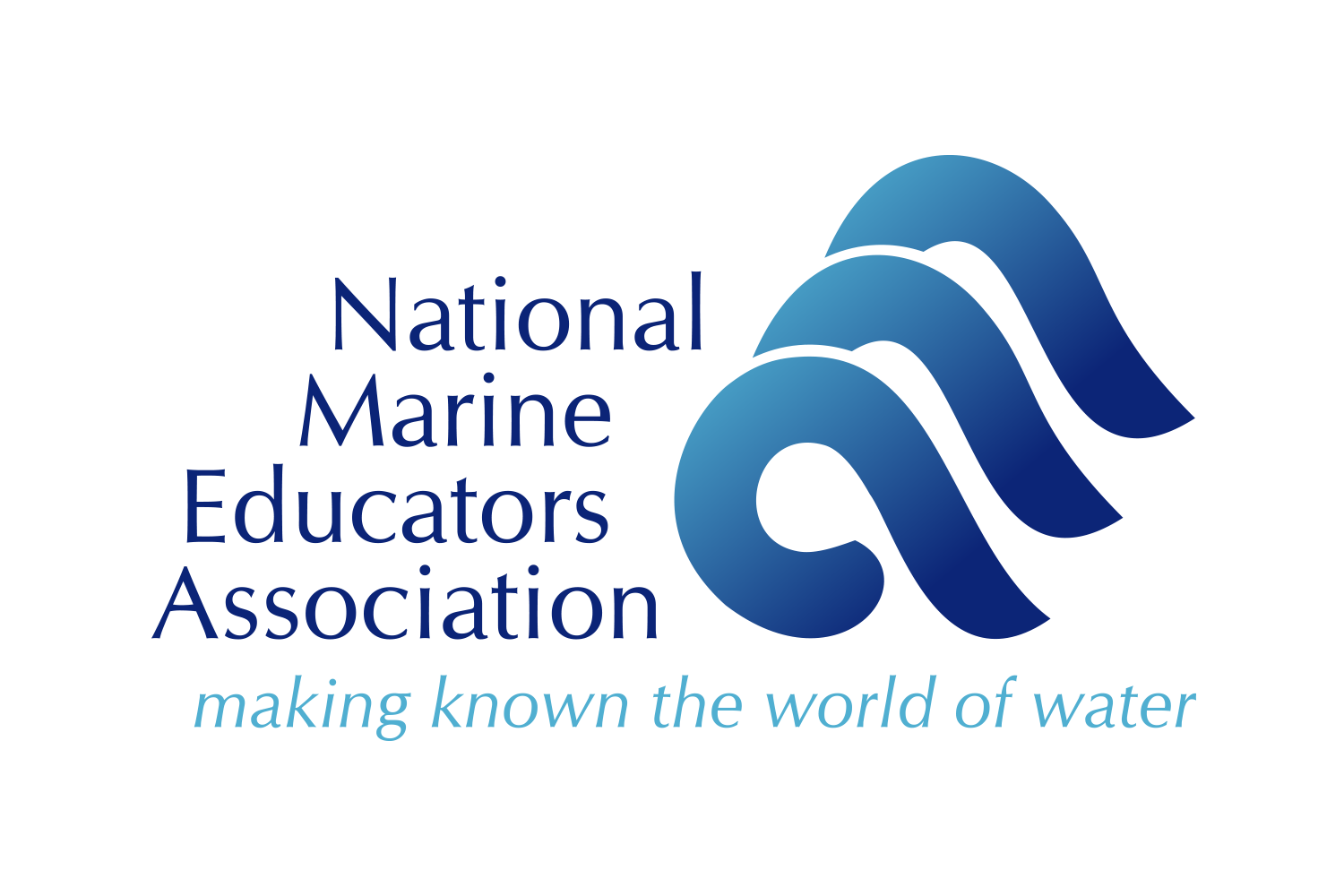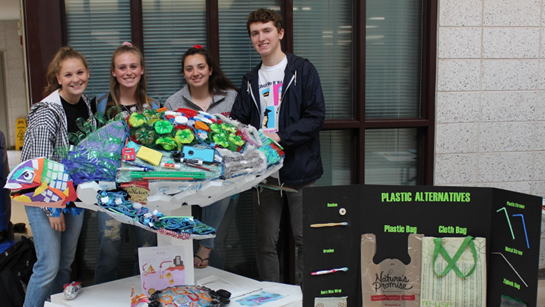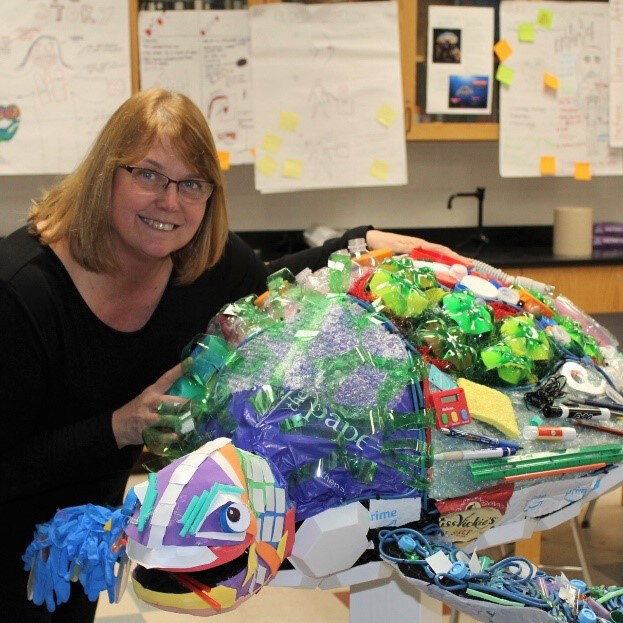Collaboration, Community and Marine Conservation in Public Schools!
Valerie Cournoyer
Marine Biology and Oceanography Teacher,
Director of Bermuda Studies
Amity Regional High School
Woodbridge, Connecticut
“Once is not enough: The struggle to reduce single use plastics” was the title of a grant funded by the Jamie Hulley Arts Foundation from Orange, CT in 2019. Art and Science came together beautifully in the Plastics in the Ocean Turtle Sculpture Project at Amity High School in Woodbridge, CT. Marine science classes worked with over 1,300 students to convey the need to eliminate single-use plastic items and to reduce use of plastics overall. These engagement activities included a week-long conservation awareness campaign at the high school using the turtle sculpture to draw students into the conversation. Student-created projects presented included alternatives to plastics demonstrations, morning announcements, distribution of water bottle stickers created by students to raise awareness of the plastics problem, and distribution of reusable grocery bags embellished with student art chosen through a school wide contest. Our annual STEAM DAY for fifth graders provided another opportunity for my students to be stewards of the ocean.
Students present the Turtle Project at a plastics outreach event for plastics week.
Interacting with 5th graders at STEAM Day.
Collaborating with the Jamie Hulley Arts Foundation brought a wider audience for this conservation work. My administration was more involved. Conversations began to pursue the Connecticut Green Leaf School designation for sustainability, In addition, our project was part of the foundation’s yearly fundraising event that reached a brand new adult audience.
Although at times it seems like an uphill battle to make any progress in conservation, to see the excitement generated at these events by the students involved gives me confidence humans can solve these problems. Connecticut passed legislation to ban plastic bags, straws and take-out containers that went in to effect in January 2020. It is my belief that this change was more easily embraced in my community by the conservation work done by the students.
Adapting for distance learning
Because we are now teaching and learning remotely, the turtle sculpture project had to be modified this year to be done virtually. Students are going to use some of the same on-line tools that I am using to create projects to educate about plastics in the ocean. Now that I am teaching from home, my district has training every morning at 8:45 am about on-line tools we can use. One tool I use often is Screencastify. I use it mostly to provide directions to tasks, but have also narrated some presentations. We have also been introduced to Edpuzzle, Padlet, Flipgrid, Zoom meetings, and Book Creator just to name a few. We have access to "how to" directions for teachers and students through our library media center. I have also started to appreciate our Gale in Context: Science resources because they have an audio function that will read to the students and a host of other tools, such as, highlighting.
I recently assigned several virtual lessons to students, one to explore the Great Pacific Garbage Patch (Day 1 activity from Activity plan: Ocean plastic from the Monterey Bay Aquarium), and another to explore Microplastics from Polar ICE. With these experiences and additional resources, they are to create a conservation message and plan to disseminate using their choice of one on-line tool. This has just been assigned and drafts should be coming in next week!
The process of teaching from home is a work in progress. Some students are very responsive, while others are mysteriously silent and elusive. It's hard to judge the room and tell if the instructions are accessible and understood. Our Power School on-line platform goes out of service regularly, which is understandable with all the usage, but frustrating! In addition to wanting to learn all you can and do your best, the reality of family and friends suffering from COVID-19 is hovering over your head every day. The uncertainty of how and when we go back to school is also stressful. I am just in the process of cancelling our school field trip to BIOS in Bermuda and mourning the loss of summer meetings and training (NMEA in particular).
Val with the Turtle Project
Val on the Appledore Island field trip at NMEA 2019
Val with the SENEME Chapter basket at NMEA 2019
Inspiration for the Turtle Project came from workshops and lectures I have attended through my local SENEME Chapter and NMEA conferences over the years. I vividly remember the “Washed Ashore” presentation at the annual NMEA meeting in Alaska in 2012 and Marine Debris Beach clean-up events sponsored by Connecticut Sea Grant in Long Island Sound. At recent events, I am finding resources I need to implement the Essential Principles and Fundamental Concepts of Ocean Literacy and the Next Generation Science Standards. When I was creating the year-long Marine Biology and Oceanography course for Amity High School five years ago, I relied heavily on the Ocean Literacy Principles to guide my units. I do have the flexibility to focus on current events and can go to the institutions I have worked with at local and national marine educator events to get lesson ideas and materials. Some favorite resources I routinely use are:
1. The Bridge Ocean Science Education Resource Center
2. Curriculum from the Monterey Bay Aquarium
3. Howard Hughes Medical Institute—BioInteractive
4. Educate—Science Friday
5. NOAA Ocean Explorer
6. Sea Perch Robotics
This is Valerie’s 20th year as a science teacher for a 7-12 Regional High School in Woodbridge, CT. She teaches marine biology courses and freshman biology. She is also the Director of their Bermuda Studies course. This course has been offered at Amity High School for over 30 years. Students study coral reef ecology and experience the Bermuda Institute for Ocean Sciences and Bermuda reefs as a culminating activity. Valerie created a full year lab science Marine Biology course around ocean literacy standards.







